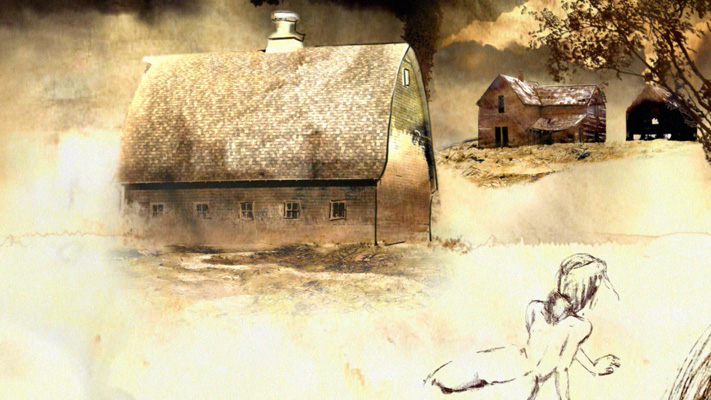
Motionpoems — coming to a screen near you
The idea of marrying film and poetry isn’t a groundbreaking idea, but it’s an ingenious one. The Poetry Foundation and PBS have taken a stab at it with “Poetry Everywhere;” former Poet Laureate Billy Collins made a foray with Action Poetry. Beyond that, I’ve noticed a growing number of stand-alone, grassroots projects and festivals devoted to the genre in recent years, presented by various filmmakers and literary types.
Even so, Motionpoems feels like something new. The brain-child of St. Paul-based poet Todd Boss and animator Angella Kassube, this project invites professional animators and filmmakers from the Twin Cities, New York City, Los Angeles, and the United Kingdom to make short videos based on new poems by nationally recognized writers — like Thomas Lux, Robert Bly, Jane Hirshfield, Mark Strand. Since last year, the project has drawn poems from those slated for inclusion in Scribner’s popular “Best American Poetry” series, edited by David Lehman.
I ask Boss if it’s difficult, as someone who works in a solitary craft, for him to give over creative interpretation of his poems to another. He laughs, saying that, from his perspective, poetry shouldn’t be so exalted as all that. The way he sees it, “[for those of us who write it] poetry gives a real playground.” He winks, “No one’s really watching anyway, so the stakes are pretty low.”
He goes on, “Actually, surprisingly few poets have been resistant to the idea. We’re very clear, when we first make contact with them, that this is going to be someone else’s vision of their poem, that they may not even like the final product. Only two poets out of the 36 we’ve asked have turned us down, and both of them did so for very personal reasons.”
Kassube, who works on the video side of things, describes the process this way: “I choose a poem for a Motionpoem in the same way I choose one I want to read. I sort of run into poems, I react to them: I want to be surprised; the concept is important to me; the poet has to be saying something in a way I’ve never thought about before, to be observing something in a way I don’t expect.”
She goes on: “Then, when I use a poem as a script, I always feel like I am holding this precious thing, and I don’t know what the rules are. I read the poem hundreds of times, trying to figure it out, looking at all the details — the images, the words, punctuation, line breaks, etc. I look at the literal interpretation so I can get past it, and then I look for the unexpected concept … Then I have to get beyond thinking about the rules and just start building.”
Boss says, “For the poet, it’s a really big compliment — huge. Someone wants to spend that kind of time thinking about and responding to your work. What’s not to love about that? It’s a total adventure and one that most of us poets never dream can be ours. I mean, a fiction writer can fantasize about someone making a movie of their story — but a poet? It’s this amazing chance to try a sort of creative collaboration we never even dreamed might be available to us.”
And after binging on the nearly 20 available on their website recently, I can attest: these Motionpoems are extraordinary. Rather than providing a linear, or straightforward, illustrative interpretation of the poems, the animation engages in something more like dance with the text piece, with plays on typography or mood, a singular metaphor or a moment’s compelling image. The finished Motionpoem is a hybrid of its constituent elements, but it’s also something distinct from both forms, offering something wholly different than either moving images or poetry on the page alone could bring.
Kassube says, “[When I create a Motionpoem] I’m not trying to make a poem better. I am trying to present that poem in a different way. I am trying to make it easier to access — visually and literally. By taking a poem off the shelf and out of a book, a different audience might see it.” She notes that they’re, by design, easy to share and disseminate online. “It is a compact version of a poem that doesn’t trail down a Facebook page, it’s easily blogged and shared. I think that makes the life of that poem a little bigger and spread out into the world a little farther.”
Unlike, say, the Poetry Foundation’s “Poetry Everywhere” project, which employed students to animate century-old, “classic” poetry, Motionpoems taps a community of experts in the field who donate their time to work with contemporary poems. The project also has access to the best image-making, motion-graphics and editing tools available — thanks in large part to thousands of dollars’ worth of volunteer post-production assistance and tech support by the team at HDMG. So, the resulting pieces look as polished and lushly designed as anything produced for commercial purposes.
And Boss and Kassube are looking to get them out there however they can. Boss explains, “Right now, we’re working on a free subscription model through the website — you can sign up to receive one new Motionpoem per month through 2012. We’re also giving them to artists, writers and publishers to share at will. There has recently been some interest from major broadcasters, and we’ve won slots in national film festivals, so they’re being embraced by the film community, too. They’ll be running in a loop on screens in the elevators during this year’s AWP conference. We want to give people as many opportunities as we can to see them.”
Poetry, especially contemporary work, rarely makes significant inroads among mainstream readers. Boss chalks that up to knee-jerk perceptions of the form’s inaccessibility. “The truth is,” he says, paraphrasing his friend and fellow poet, Tim Nolan, “poetry matters so much, and it matters so little. There’s no need for people to be afraid to try new poetry.”
Kassube echoes that sentiment, saying, “I know people — not poetry readers — who have gone to our website to watch a Motionpoem, and then they READ the poem. And then they watch the Motionpoem again. The experience probably didn’t inspire them to buy a book, but maybe it changed their opinion (intimidation, fear, thought that it’s too complicated) about poetry a little.”
Watch two years’ worth of Motionpoems, 19 in all so far, subscribe to get one per month, delivered for free to your inbox all year, and keep track of screenings in Minnesota and throughout the country: http://www.motionpoems.com/ The two Motionpoems up top offer a preview of what’s to come for the 2012 season in the series.
Recent Content
-
Artsarticle ·
-
Artsarticle ·
-
Artsarticle ·




